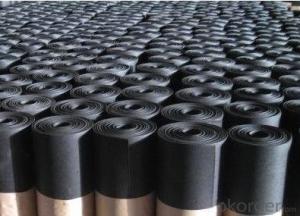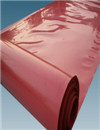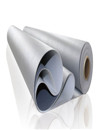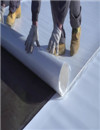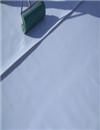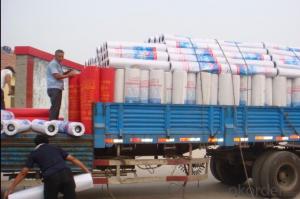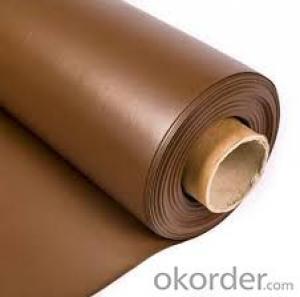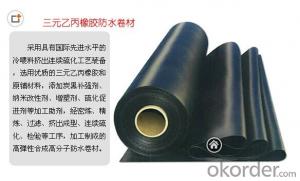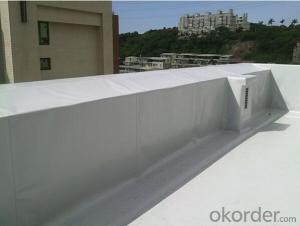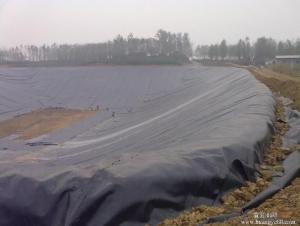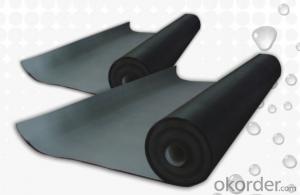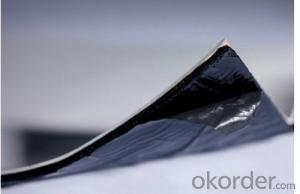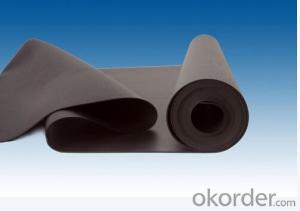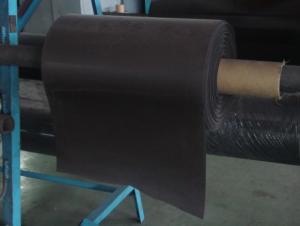EPDM Waterproof Membrane for Roofing Industry
- Loading Port:
- Qingdao
- Payment Terms:
- TT or LC
- Min Order Qty:
- 20000 m²
- Supply Capability:
- 600000 m²/month
OKorder Service Pledge
OKorder Financial Service
You Might Also Like
Product Description of EPDM Waterproof Membrane for Roofing Industry
1.EPDM Waterproof Membrane / Roofing Material / Sheets Roofing
2.High tensile strength.
3.Good elongation.
4.UV resistant.
5.Anti-corrosion.
Product instruction of EPDM Waterproof Membrane for Roofing Industry
EPDM waterproof membrane is made from ternary ethylene-propylene rubber. With the best performance among high polymer waterproof materials, EPDM is of exceptional elasticity and will not split or crack under normal building movement.
Features of EPDM Waterproof Membrane for Roofing Industry
1) Excellent weather-ability, durability and size stability
2) Good adaptability to high and low temperature, UV resistant and anti-corrosion
3) High tensile strength and good elongation, accommodating to structure movement
4) Easy installation, solid joint, and no environmental pollution
5) Good rooting penetration resistance
6) Service life up to 50 years
Application of EPDM Waterproof Membrane for Roofing Industry
1) Roofs, Basement, Toilet
2) Industrial and civil building waterproofing
3) Geo-synthetic liner for swimming pool, channels, irrigation system
4) Especially suit for projects with high requirements in durability, anti-corrosion and deformation
Technical Parameters of EPDM Waterproof Membrane for Roofing Industry
EPDM Waterproof Membrane ASTM Standard : D-7465 | ||||
Property | Test Method | Units | Mininum ASTM | |
D-7465 | ||||
Sl | Eng | |||
Specific Gravity | ASTM D-792 | gm/cc | 1.1 | 1.1 |
Unit Weight | ASTM D-751 | kg/m2 | 1.3 | 0.27 |
Thickness Type 1 | ASTM D-412 | mm(in) | 1.02 | 0.04 |
Tensile Strength. Die C | ASTM D-412 | Mpa(psi) | 9 | 1305 |
Ultimate Elongation,Die C | ASTM D-412 | % | 300 | 300 |
Tear Resistance,Die C | ASTM D-624 | Kn/m(lbf/in) | 26.27 | 150 |
Puncture Resistance | ASTM D-4833 | N(lbs) | 133 | 30 |
Shore A Durometer | ASTM D-2240 | 65-10 | 65-10 | |
Ozone Resistance | ASTM D-1149 | No Crack | No Crack | |
Multiaxial Elongation | ASTM D-5617 | % | 100 | 100 |
Heat Aging 28 days at 240 degrees | ASTM D-573 | |||
Tensile Strength, Die C | ASTM D-412 | MPa(psi) | 8.3 | 1205 |
Ultimate elongation, Die C | ASTM D-412 | % | 200 | 200 |
Tear Resistance, Die C | ASTM-624 | Kn/m(lbf/in) | 21.9 | 125 |
Accelerated Aging Xenon Arc | ASTM G-155/G-151 | Pass | Pass | |
Brittleness Point | ASTM D-2137 | -45 °C | -49 °C F | |
Water Absorption | ASTM D-471 | % | +8,-2 | +8,-2 |
Water Vapor Permeability, max | ASTM E-96 | Permils | 2.0 | 2.0 |
Linear Dimensional Change,max | ASTM-D-1204 | % | +/-1.0 | +/-1.0 |
Chronic Toxicity Screening | EPA/600/4-89/001 | Method 1000.0 | Pass | Pass |
FAQ:
1. What are we supplying?
We are specialized in producing Colorful Asphalt Roof Shingle, SBS/APP modified bitumen waterproof membrane, Self adhesive bitumen waterproof membrane, PVC waterproofing membrane, EPDM rubber roofing membrane, Single Component Polyurethane Waterproof Coating, and Spray Polyurea Waterproof Coating
2. What is your main market?
Our EPDM Waterproof Membrane for Roofing Industry sells very well in USA, United Kingdom, Austrilia, Canada, Japan, Pakistan, etc.
3. What is your advantage for EPDM Waterproof Membrane for Roofing Industry ?
With the most advanced production line, our good quality is based on superior material imported from America.
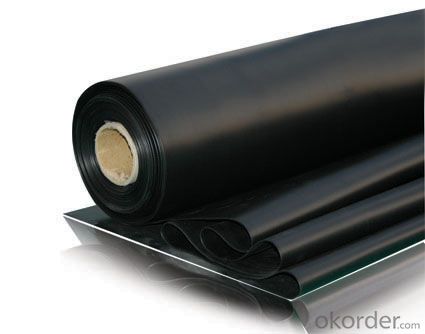
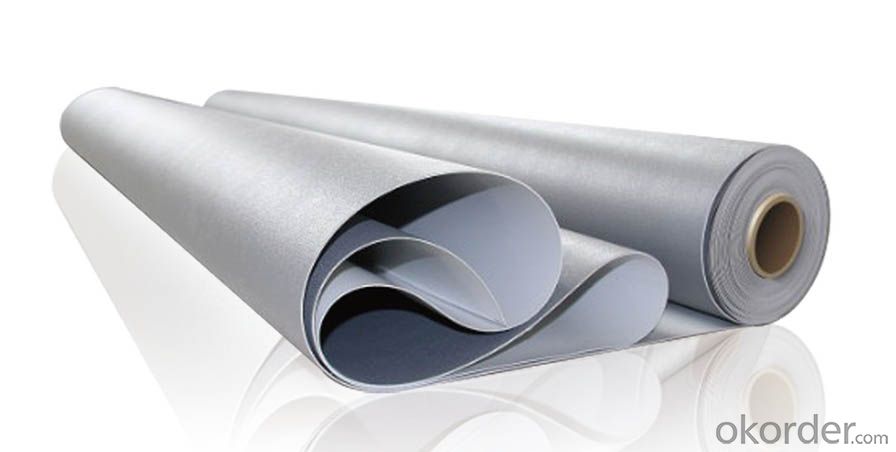
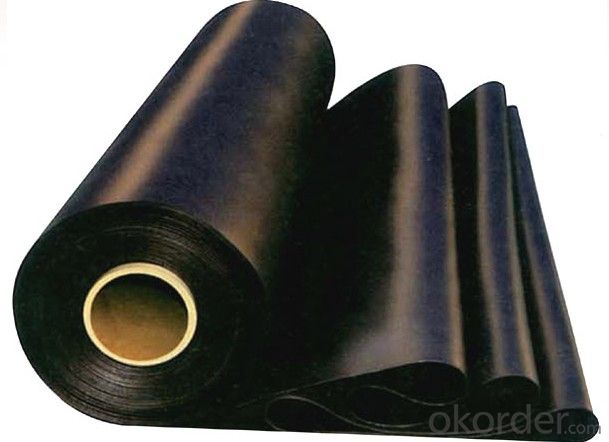
- Q: Can a waterproofing membrane be used on breeze block surfaces?
- Using a different grammatical structure and expressions: Indeed, breeze block surfaces can benefit from the application of a waterproofing membrane. These concrete blocks, also known as breeze blocks, are commonly utilized in construction due to their porous nature. This porosity allows water to infiltrate the blocks, which can potentially lead to dampness or water-related harm within the building. To counteract this issue, the surface of the breeze blocks can be treated with a waterproofing membrane. A waterproofing membrane is a thin layer of material specifically designed to impede water penetration. It acts as a protective barrier, preventing water from seeping into the breeze blocks and safeguarding the underlying structure against moisture damage. This membrane is typically applied in either liquid or sheet form and securely adhered to the surface of the breeze blocks using an appropriate adhesive. Prior to applying the waterproofing membrane, it is crucial to adequately prepare the surface of the breeze blocks. This may involve thorough cleaning to ensure the absence of loose debris or contaminants. Additionally, any existing cracks or gaps in the breeze blocks should be addressed and repaired prior to the membrane application. This meticulous preparation is necessary to achieve a seamless and effective waterproofing system. It is important to note that the selection of the appropriate waterproofing membrane depends on the specific requirements of the project and the conditions to which the breeze block surface will be exposed. There are several types of waterproofing membranes available, such as liquid-applied membranes, sheet membranes, or cementitious coatings. To determine the most suitable membrane for your particular application, it is advisable to consult with a professional or the manufacturer. In conclusion, the utilization of a waterproofing membrane on breeze block surfaces is an effective means of preventing water penetration and safeguarding the underlying structure against moisture damage. Proper surface preparation and careful consideration of the appropriate membrane type are vital elements in achieving a successful waterproofing solution.
- Q: Can a waterproofing membrane be used for walkways or pedestrian bridges?
- Yes, a waterproofing membrane can be used for walkways or pedestrian bridges. Waterproofing membranes are designed to protect surfaces from water infiltration and can be applied to various structures, including walkways and pedestrian bridges, to prevent water damage and ensure their longevity.
- Q: Can waterproofing membranes be used on concrete tunnels?
- Yes, waterproofing membranes can be used on concrete tunnels. Waterproofing membranes are commonly used in construction to prevent water infiltration and protect structures, including concrete tunnels, from moisture damage. These membranes create a barrier that prevents water from seeping through the concrete and into the tunnel, ensuring its durability and longevity.
- Q: Does a waterproofing membrane have any impact on the thermal performance of a structure?
- Yes, a waterproofing membrane can have an impact on the thermal performance of a structure. A waterproofing membrane is typically used in buildings to prevent water infiltration, which can cause damage to the structure over time. By creating a barrier against moisture, the membrane helps to maintain the integrity of the building envelope and protect against potential leaks or water damage. In terms of thermal performance, a waterproofing membrane can help to improve insulation by reducing the amount of heat transfer through the building envelope. By preventing moisture from entering the structure, the membrane also helps to prevent the formation of condensation, which can lead to mold growth and further damage to the building materials. Furthermore, some waterproofing membranes are designed with additional insulation properties, such as foam or reflective coatings, which can further enhance the thermal performance of a structure. These membranes help to reduce thermal bridging and improve energy efficiency by minimizing heat loss or gain through the building envelope. It is important to note that the impact of a waterproofing membrane on the thermal performance of a structure can vary depending on the specific type of membrane, its installation, and the overall design of the building. It is advisable to consult with a professional architect or engineer to determine the most suitable waterproofing solution that meets both the water resistance and thermal performance requirements for a particular structure.
- Q: Pvc waterproof membrane of the scope of application
- PVC polymer waterproofing membrane Features: 1, PVC waterproofing membrane tensile strength, elongation is good, thermal size change rate is small; 2, anti-aging, resistant to ultraviolet radiation, chemical resistance, resistance to root penetration;
- Q: Can waterproofing membranes be applied in cold weather?
- Indeed, waterproofing membranes are capable of being applied in chilly conditions. Nevertheless, it is imperative to take into account several factors when carrying out the application of these membranes in low temperatures. The curing process of the membrane can be affected by cold weather, which has the potential to decelerate it. Consequently, it is of utmost importance to ensure that the surface to be waterproofed is devoid of moisture, ice, or frost prior to the application of the membrane. Furthermore, certain waterproofing products might possess specific temperature prerequisites for attaining optimal performance, thus referring to the manufacturer's guidelines becomes indispensable. In colder temperatures, the employment of specialized adhesives or primers tailored for cold weather applications may also become necessary. All in all, by adopting appropriate precautions and utilizing suitable materials, it is feasible to successfully apply waterproofing membranes in cold weather.
- Q: Is a waterproofing membrane suitable for both residential and commercial applications?
- Yes, a waterproofing membrane is suitable for both residential and commercial applications. A waterproofing membrane is a versatile material that can be used in various settings to protect buildings and structures from water damage. Whether it is a residential home or a commercial building, a waterproofing membrane can be applied to foundations, roofs, walls, and other areas that are susceptible to water infiltration. It provides a protective barrier that prevents water from seeping into the structure and causing damage such as leaks, mold, and deterioration. Additionally, a waterproofing membrane can be customized to meet the specific needs and requirements of both residential and commercial applications, making it a suitable choice for any type of building.
- Q: Are waterproofing membranes resistant to rodent and insect infestation?
- Waterproofing membranes are generally not specifically designed to be resistant to rodent and insect infestation. While they may provide a barrier against water and moisture, they may not necessarily prevent rodents and insects from accessing or damaging the membrane. It is advisable to take additional measures, such as using pest control methods or installing barriers, to effectively address rodent and insect infestation issues.
- Q: Can a waterproofing membrane be used for foundation walls?
- Yes, a waterproofing membrane can be used for foundation walls. Waterproofing membranes are commonly used to protect foundation walls from moisture, preventing water penetration and potential damage to the structure. These membranes are designed to create a protective barrier against water, helping to keep the foundation dry and maintaining its structural integrity.
- Q: Are waterproofing membranes resistant to hydrostatic pressure?
- Yes, waterproofing membranes are designed to be resistant to hydrostatic pressure.
Send your message to us
EPDM Waterproof Membrane for Roofing Industry
- Loading Port:
- Qingdao
- Payment Terms:
- TT or LC
- Min Order Qty:
- 20000 m²
- Supply Capability:
- 600000 m²/month
OKorder Service Pledge
OKorder Financial Service
Similar products
Hot products
Hot Searches
Related keywords
